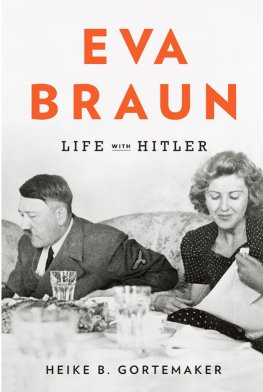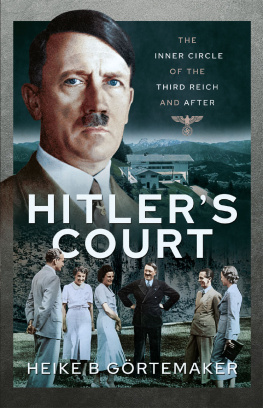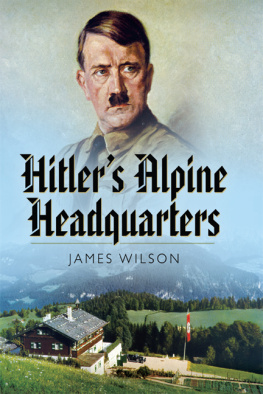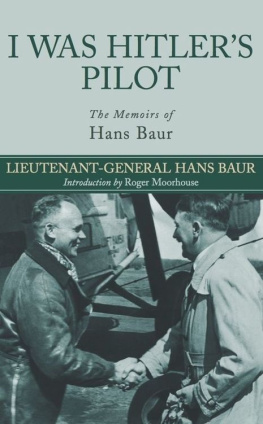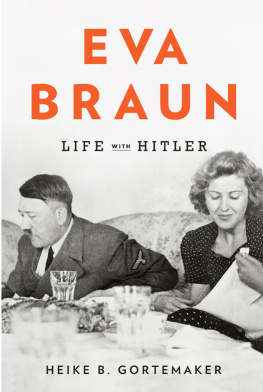Heike B. Grtemaker
EVA BRAUN
Life with Hitler
Translated from the German by Damion Searls
On March 7, 1945, when Eva Braun had a chauffeur bring her in a diplomatic car from Munich to Berlin, she wanted to write the final chapter of her story herself.1 That story had begun in 1929, in the offices of a Munich photographer, Heinrich Hoffmann, where she met the leader of a far-right political party that had not, at the time, been very successful: the National Socialist German Workers Party (Nationalsozialistiche Deutsche Arbeiterpartei, or NSDAP). That leaders name was Adolf Hitler. Now she was driving to the capital, against his will, in order to die with him.
Hitler had ordered her to stay on the Obersalzberg, a mountain in the Bavarian Alps near Berchtesgaden, where he owned a large residence called the Berghof. Berlin was badly damaged, practically destroyed, after the Allied air strike of February 3; the air-raid sirens were sounding several times a day. The Soviet Red Army had reached the Oder River in January, while American and British forces, supported by numerous allies, were approaching from the west. As a result, no one in the Reich Chancellery expected Eva Braun to appear. Albert Speer remarked about her arrival in his memoir Inside the Third Reich: Figuratively and in reality, with her presence a messenger of death moved into the bunker.2 Be that as it may, she was also stepping out from the shadows of her existence as merely a mistress. Her name became inseparable from that of Hitler, and she herself, with their joint death, became a legend with him. Is that what she wanted?
No one, writes the British historian Ian Kershaw, shaped the twentieth century more powerfully than Adolf Hitler. The shocking experience of a modern, advanced, cultured society so rapidly sink[ing] into barbarity3 has undeniably had consequences down to the present day. In the process, the name Hitler has become a symbol: around the world, standing for violence, inhumanity, racism, perverted nationalism, genocide, and war. Ever since January 30, 1933, when Hitler was named Chancellor by President Paul von Hindenburg and the NSDAP legally came to power, there have been countless attempts not only to describe the structure and institutions of the National Socialist dictatorship, but also, more than anything, to explain the phenomenon of Adolf Hitler.4 The debates continue even today.
Eva Braun, in contrastthe mistress for many years and eventually the wife of evil incarnatehas been seen as historically insignificant, as a very pale shadow of the Fhrer,5 even as a historical disappointment, in Hugh Trevor-Ropers words. As nothing. The reason for this was the belief that Eva Braun played no role in the decisions that led to the worst crimes of the century, that she was nothing more than part of Hitlers private pseudoparadise, which may in fact have made it possible for him to pursue his monstrous horrors all the more persistently.6 Thus Eva Braun has remained a marginal figure in the biographies of Hitler. The few books that treat her own life story emphasize her allegedly tragic fate as a woman and refrain from presenting Hitlers girlfriend in her social, cultural, and political contextsunless the books author has an ideological agenda of his or her own.7
This disregard of Eva Braun as a historical figure is due in no small part to the dominant image of Hitler in the historical literature, because the question of whether Hitler should be portrayed as a human being at all is a controversial one even now. Some of his biographers maintain that their subject is a nonperson; Joachim C. Fest, for example, in the early 1970s, admitted that Hitler had apparently overwhelming power and his own kind of greatness, but criticized the paleness of his person and his rigid, statuelike, theatrical appearance, while remarking on Hitlers inability to lead an everyday life.8 Decades later, Ian Kershaw said that Hitlers entire being was given over to his role as Fhrer, to the point where he lacked a private, a deeper existence: the personal life of this despot who had an extraordinary kind of charismatic power consisted, according to Kershaw, of nothing more than a chain of empty routines.9 Even from a distance of sixty years, even while they are convinced that historical scholarship has painstakingly taken the measure of the abyss, historians persist in looking at the grotesque face of the monster when it comes to Hitler himself.10
But doesnt this interpretation risk succumbing to Hitlers own self-presentation, according to which his individuality was of secondary importance? Do we not thereby dehumanize him, and as a result let him escape our critical understanding? It was Joseph Goebbels after all, Hitlers Minister of Public Enlightenment and Propaganda, who tirelessly promulgated the idea that the Fhrer had sacrificed his private life and all of his individual happiness for the German Peoplethat he stood above all the daily worries and cares of ordinary mortals like a rock in the sea.11 Are we not still creating an artificial figure when we look back at him in this way, one that only makes it harder for succeeding generations to confront their own histories and understand the nature of the Nazi dictatorship?
In no way do I mean to argue for an overemphasis on the individual in history. Nor am I suggesting that we should show understanding for the dictators private side, especially since that dictator has already become an object of dubious fascination as the devil in person. Rather, a serious, source-critical study of Eva Braun, which no one has carried out until now, offers a new perspective on Hitler, and one that can help undo his demonization.
Thus the question is: Who was this woman, actually, and what perspective does she open up onto this criminal of the century? The fact is that Eva Braun and Adolf Hitler were together for fourteen yearsa relationship that ended only with their double suicide. Moreover, this relationship was one of Hitlers few close personal ties to any woman at all. She was largely concealed from the German public, and in terms of external appearance, Eva Braunyoung, blond, athletic, attractive, fun-lovingabsolutely did not fit Hitler with his psychopaths face (Joachim Fests phrase), who looks prim, stiff, and elderly in the private photographs in which he appears. Eva Braun, it is said, loved fashion, movies, and jazz; read works by Oscar Wilde (who was banned in Germany after 1933); liked to travel; and pursued sports to excess.12 Her life hardly corresponded to the petit bourgeois ideal of the German woman as propounded by Nazi ideology: bravely defending the husbands home and her motherhood before all else. So what did connect Eva Braun to Hitler? What were her relations like with the men in the Nazi leaders innermost circleHermann Gring, Albert Speer, and Martin Bormann? What light does this relationship shed on Hitler? Did he live with his lover in a kind of parallel private world that was fundamentally opposed to the official Fhrer image? Or is it in fact impossible to separate public and private in this way? Did both worlds belong together inseparablyfor Eva Braun as well as for Hitler?
By all appearances, Eva Braun was a young woman of average abilities from a conventional, lower-middle-class family. She clearly did not stand out due to her background or her interests. It is often mentioned that she was noticeably lacking in any political sympathies or interest in current events at all.13 Eva Braun was not sophisticated and glamorous like Magda Goebbels, nor was she politically influential like Annelies von Ribbentrop (daughter of the champagne manufacturer Otto Henkell), nor did she possess the fanaticism of a Gerda Bormann. But it is precisely her allegedly average ordinariness that invites us to reconstruct her historical circumstances. Her normality at the center of this atmosphere of evil is like an anachronism that brings this evil into relief and shows it in a new light.

